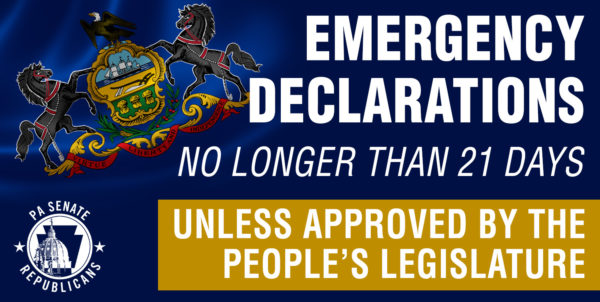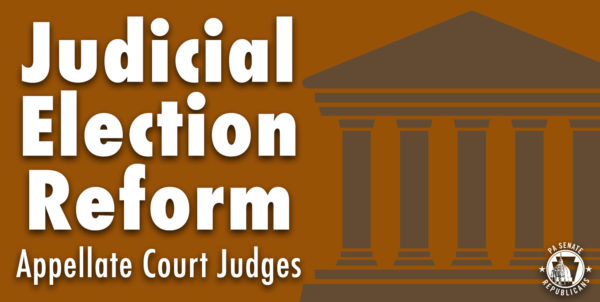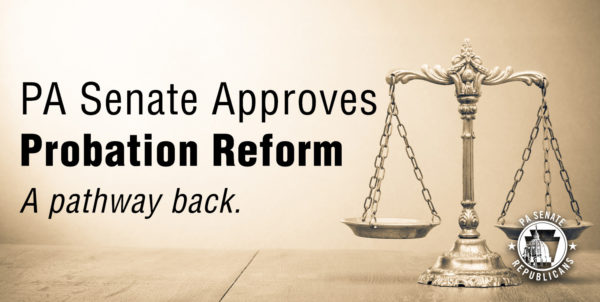
|
|||||
|
In This Update:
Concerns Regarding Governor’s New Covid-19 RestrictionsGovernor Wolf’s announcement is a bitter pill to swallow for business owners and employees who have played by Governor Wolf’s arbitrary rules for months at great expense. Asking restaurants to open at 50 percent capacity was a heavy lift for the industry, but the newest edicts from Governor Wolf represent an even greater burden on an industry that is already struggling. These new restrictions will only lead to more businesses closing and more employees being laid off at a time when we can afford neither. This is yet another disappointing example of Governor Wolf taking broad action without consulting the General Assembly or county officials whose perspectives are vital in the fight against COVID-19. Constitutional Amendment to Limit Emergency Declarations Earns Senate Approval
The Senate voted in favor of a bipartisan bill this week that would amend the Pennsylvania Constitution to limit future emergency declarations and require legislative approval of any declaration lasting more than 21 days. The bill would create three separate ballot questions: one to limit emergency declarations, another to clarify the General Assembly’s authority to terminate or extend a disaster declaration without the governor’s approval, and a third to ensure equality under the law and prevent discrimination based on race or ethnicity. Because the bill would amend the state Constitution, it does not need to be approved by the Governor. Instead, it must be approved by the General Assembly in two consecutive legislative sessions before being approved by voters via referendum. General Assembly Passes Constitutional Amendment Reforming Judicial Election Process
The Senate approved a potential amendment to the Pennsylvania Constitution this week to reform the process of electing appellate court justices. The bill would divide the Supreme Court, Superior Court and Commonwealth Court into judicial districts to ensure a broader range of regional interests are represented on Pennsylvania’s highest courts. Since judges are currently elected on a statewide basis, the majority come from the state’s two most populous counties, resulting in most of the state being underrepresented on the state’s highest courts. Dividing the state into judicial districts will end the current system of disproportionate representation and ensure the perspectives of all regions of the state are reflected in the makeup of the judicial branch. The bill would guarantee equal representation for all Pennsylvania communities in the appellate court system. This is about fairness so the rural parts of the state can finally get a fair shake. Our region deals with judges from Philadelphia and Allegheny counties, and our voices are never heard. Listen The Senate and the House of Representatives have each approved the bill, which does not require the governor’s signature. As a constitutional amendment, the legislation must be approved again in the next legislative session before being put on the ballot for voters to decide. Applications Available Now for Beginning Farmer Tax Credits
Experienced farmers will now have an incentive to sell or lease land, buildings and equipment to beginning farmers thanks to a new tax credit program that was created last year. Applications for the Beginning Farmer Tax Credit Program can be filed now at esa.dced.state.pa.us. Under the program, landowners will receive a one-time personal income tax credit for the sale or a multi-year lease of property. The legislation requires all leases be enforced through written agreements and that the sale of property be for fair market value in order to qualify for the tax credit. Complete program guidelines, eligibility, and application instructions are available here. Legislation to Restore Transparency in State Government Heads to the Governor
The Senate gave final approval to a bill this week that would restore transparency in state government by prohibiting the governor from directing a state agency to ignore records requests during an emergency declaration. The legislation would ensure Pennsylvanians can continue to access public records during a disaster declaration. The bill is retroactive to Governor Wolf’s March 6 disaster declaration. Governor Wolf has been widely criticized for failing to provide any sense of transparency during the public health emergency, including ignoring a subpoena for information related to his confusing and inconsistent waiver process for businesses that wished to remain open during the pandemic. New Law will Support Development of Blighted Properties
My bill was signed into law giving municipalities a new tool to transform blighted properties into thriving parts of the community. Act 61 of 2020 will allow local taxing authorities to provide a tax exemption for up to 10 years for any improvements and new construction on blighted properties in deteriorated areas. The amount of the exemption will decline by 5 to 15 percent per year before expiring after the tenth year. The bill focuses on mixed-use redevelopment including both residential and non-residential uses, in order to support the development of more vibrant communities. We have many properties throughout the region that have great potential for future use, but municipalities do not have the tools they need to ensure these buildings can be rebuilt or restored properly. Read more here. Senate Passes Bipartisan Probation Reform Proposal
A bipartisan bill to improve Pennsylvania’s probation system received the unanimous approval of the Senate this week. The bill would give the courts stronger guidelines and restrictions on sentencing to ensure periods of incarceration are limited to individuals who commit new crimes or serious violations. The bill also creates incentives for probationers to succeed through credits for good behavior, such as maintaining a job and performing community services. In current practice, technical violations that are not actual crimes – such as being late for an appointment, traveling out of state or being unable to pay fines and restitution – can lead to extensions of probation or prison time that far exceed the original sentence handed down at trial. The cost to incarcerate these individuals is much greater than the cost of supervision, resulting in wasted taxpayer dollars without any benefit in terms of public safety. Bill Would Provide Greater Flexibility in Obtaining Teacher Certifications
The COVID-19 pandemic created a severe disruption in the certification process for teachers, as testing centers were closed statewide. The Senate approved a bill this week that would help teachers, recent graduates, undergraduate students and paraprofessionals to navigate the state required certification process. The legislation will enable graduates to obtain temporary certifications and extend certain deadlines to provide additional flexibility so schools are not faced with additional challenges in recruiting staff when reopening schools. New Laws Support Police Reform, Child SafetySeveral noteworthy bills that were approved by the Senate recently were signed into law this week, including:
|
|||||
|
|||||



Want to change how you receive these emails? 2025 © Senate of Pennsylvania | https://senatorjudyward.com | Privacy Policy |






